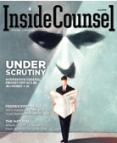 The June issue of InsideCounsel has a nice piece on fraud on the Trademark Office. It accurately frames the problem as follows:
The June issue of InsideCounsel has a nice piece on fraud on the Trademark Office. It accurately frames the problem as follows:
“In the past few years, the [Trademark Trial and Appeal Board] has adopted an extremely tough attitude toward trademark filings that contain overly broad statements of use. The agency has canceled many registrations, belonging to companies large and small, because the companies wrongly averred that they were using their marks on some goods or services.”
This is a tough one. If a trademark owner files a statement saying it uses a given mark in connection with 20 categories of goods and services, and in actuality it only uses the mark in connection with 19 categories, its entire registration is at risk. Forget about honest mistakes.
As the article puts it, “Not only has the TTAB adopted a tough objective standard, but it also has applied this standard mercilessly.”
So what’s a trademark owner to do?
It should audit its portfolio to ensure its most valuable marks are in good stead. If they’re not, it should file narrower follow-on applications that will stand up to scrutiny in the event the original registration falls. It should correct any errors promptly, voluntarily, and in good faith — before an adversary brings them to the PTO’s attention. And it should make sure, going forward, that its statements to the PTO are 100% accurate. After all, they’re made under oath.